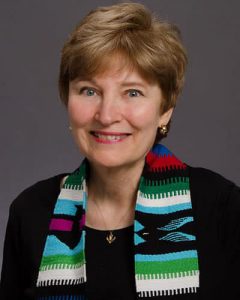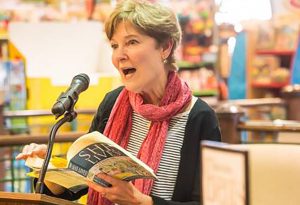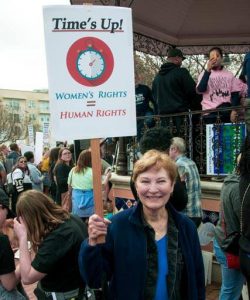Jann Aldredge-Clanton was one of the most complex and compassionate people I’ve ever met.
Her combination of Southern charm and progressive theology could be both disarming and alarming to those she encountered. She was a trailblazer for sure, setting plenty of brushfires along the way while caring for her family and tending to cancer patients as a chaplain.
Ironically, Jann died at age 78 of ovarian cancer in the very Dallas hospital where she comforted others for years. Even there, she was a constant advocate for greater inclusion. I recall years ago her passion for creating an interfaith prayer garden at the Baptist-affiliated hospital, which rankled some of the old white men among the trustees. That was classic Jann.

Jann Aldredge-Clanton
One of her sons told me he saw the fruit of her labor even at the time of her passing. Upon her death, two hospital chaplains appeared at the door — one a Latina woman and one a Black woman. Jann had advocated for years to diversify the chaplain force with more women and more people of color.
If you met Jann in a social setting — as I first did several decades ago — you might believe she was a stereotypical daughter of a Southern Baptist pastor from Louisiana. She always exhibited tremendous grace and hospitality and compassion and made you feel welcome in her home or in her presence.
But once the conversation got going, you’d soon realize you were in over your head. Jann read and thought and wrote at a level higher than most of us mere mortals can comprehend. She not only was ahead of her time, her thoughts were higher than our thoughts.
Her passion was gender equity, especially in the church. She stressed the importance of using feminine images and language for the divine as a foundation for equality, justice and peace.
“Her passion was gender equity, especially in the church.”
“My vision is of a church where the divine feminine and women ministers don’t have to be defended or marginalized but are fully and equally included throughout every worship service and every activity of the church,” she wrote in the introduction to Changing Church: Stories of Liberating Ministers, her 2011 book profiling progressive female ministers.
That was one of 11 books, six songbooks, a children’s musical, and a children’s songbook she wrote. She was working on her next collection of hymns, with collaborator Larry Schultz, the week before she died.
Music is the way Jann most often conveyed her theology because, having been raised in the church, she knew we sing what we believe and we believe what we sing. She was one of the first people I encountered who regularly pointed out the male-dominant language in so many of our hymns. And once you see it, you can’t unsee it.

Jann Aldredge-Clanton at a 2015 book reading.
Still, changing the words of beloved hymns is a tough sell, so Jann found a workaround: She started writing hymns. That allowed her to convey not only feminine pronouns but also feminine themes.
Her best-known hymn in our church is “Like A Mother with Her Children,” a beautiful text that compares the nurturing love of God to the love of a mother.
There should be nothing radical about this language, yet in the male-centric world of Southern Baptists, simple turns of phrase can be threatening. Those are the kinds of barriers Jann faced all her career, demonized as a “liberal” or a “radical feminist.”
I’ll admit Jann often was ahead of my own theological understanding, but she helped pull me forward even when I couldn’t get fully where she landed. Jann challenged us to think differently, to see anew, to rethink.
Our mutual friend Brian Burton described her well: “All of us touched by Jann’s vibrant, whimsical and powerful spirit are better, stronger and wiser because of her. As an indomitable Christian prophet and feminist theologian, Jann used the pen, Scripture, poetry and song to spread her convictions and truth. … I learned tons about language and expansive images of God from Jann, and much, much more … the art of forgiveness, loving my neighbor, partaking grace, claiming my voice and discerning when to be patient and when to be defiant on the many detours along the winding road towards justice.”
He rightly said: “As I attempt to find ways to honor Jann, I will cling to her enduring example of finding holiness, joy, beauty and hopeful possibility in every situation and circumstance, enlivening every believable creed with music, and recommitting to lighting and lightening life’s pathway for all who struggle on the ragged rim of our religious, moral and economic life.”
“I will cling to her enduring example of finding holiness, joy, beauty and hopeful possibility in every situation and circumstance.”
In her work as a chaplain, Jann also mentored and blessed another mutual friend, Alan Wright, who now follows in her footsteps at the hospital.
“It was an honor to work alongside Jann as an oncology chaplain,” he told me. “She was a wonderful mentor. As much as I learned from her skilled practice of caregiving, I’ll remember her most for her consistent encouragement. She would repeat to me, ‘Keep writing, keep teaching, keep being creative in your ministry.’ Jann was able to uniquely balance power and kindness and be boldly creative.
“This encouraged people like me who were often challenged by Jann’s scholarship to listen and take the beautiful risk to alter our traditional images of God and love a more diverse God that reflects her creation.”
Jann always will be in that great cloud of witnesses cheering on those who come behind her. That includes thousands of Baptist women in ministry who have opportunities today that were denied to women like Jann 30 years ago.
In 1985, she became one of the first women ordained as a minister in a Southern Baptist church. And she had trouble getting hired in a church. While she ultimately found her calling in chaplaincy, she continued to open the door for women in all forms of ministry.

Jann Aldredge-Clanton promoting Christian Feminism Today at the Dallas Women’s March in 2018.
Jann “was an unstoppable trailblazer for women’s equality among Baptists and throughout the church,” Meredith Stone told me. “The Baptist Women in Ministry community greatly benefited from her relentless passion for gender justice as she was among the early leaders of our movement, preached for one of our earliest annual gatherings (1988), co-founded a sister organization in Equity for Women in the Church, served as a mentor and amplifier to countless women in ministry over the years, and has written many powerful hymns which are anthems for our cause.”
That connection is memorialized in a hymn of Jann’s commissioned by Baptist Women in Ministry to honor the foremothers of the organization last year.
“We knew a uniquely commissioned hymn from Jann would capture the remembrance and celebration in a way that nothing else could,” Stone said. “She was a gift and a catalyst to our community, and she will be deeply missed.”
Over time, the new wine of Jann’s faith spilled over beyond the traditional church. She and her husband, David, helped start an innovative congregation in Dallas 25 years ago, then she moved on to help others in new expressions. She was one the founders of New Wineskins, an appropriately named inclusive worship community in Dallas. She also was a regular attendee of The Gathering, a Womanist Church, which prioritizes racial equity, social justice and LGBTQ equality.
She is survived by her husband, David Clanton, and their two sons — Chad and his partner Maura Mullins, and Brett and his wife, Beth Lousteau and their three sons, Lyle, Emmett and Paul, as well as her sister, Anne Morton, and brother-in-law, Bill Funderburk.
A memorial service will be held at 1 p.m. on Saturday, Oct. 5, at Wilshire Baptist Church in Dallas.
